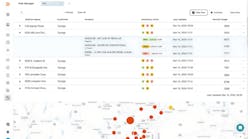Just weeks from now, the first of three one-day Cargo Tank Rollover Prevention Summit meetings will be convened in St Louis, Missouri. The summit meetings are being co-sponsored by the Department of Transportation (DOT), National Tank Truck Carriers Inc (NTTC), and Bulk Transporter magazine.
The St Louis summit will take place November 14 at the Renaissance St Louis Grand Hotel. The second summit will be November 28 in Baltimore, Maryland, at the Westin Hotel Linthicum (BWI Airport), and the final summit will be December 4 at the Marriott Oakland City Center Hotel in Oakland, California. All of the meetings are free.
These summit meetings offer members of the tank truck industry an extraordinary opportunity to provide input on an issue that is getting very close scrutiny from a wide range of federal officials, including members of the House of Representatives. It wasn't by chance that the Oakland venue was selected for one of the summit meetings.
That's home base for Speaker of the House Nancy Pelosi, who has been calling for federal action on tanker rollovers. It's also where a petroleum transport overturned in April causing a fire that badly damaged sections of highway connecting Interstates 580 and 980 to the Bay Bridge that links Oakland and San Francisco.
That tanker rollover was similar to others that were studied over the past several years as part of the recently issued Cargo Tank Roll Stability Study conducted by Battelle for the Federal Motor Carrier Safety Administration (FMCSA). The study suggests that the average annual number of cargo tank rollovers exceeds 1,260, and there are indications that the frequency is rising.
Researchers conducting the Battelle study concluded that rollovers are among the most serious crashes for cargo tank motor vehicles carrying hazardous materials. They are more likely to be fatal to the driver, and they can cause spills and necessitate highway closures. Initial accident data reviewed by FMCSA in 2005 suggested that cargo tank rollovers account for one in four tanker driver fatalities.
The Battelle study looked at four complementary approaches for reducing cargo tank rollovers: Driver training, electronic stability systems for tractors and trailers, improvements in vehicle design, and highway design factors.
On the driver side, driver error stands out as a contributing factor in 75% of tanker rollovers. Inattention, distraction, and drowsiness account for up to 20% of rollovers. Evasive driving maneuvers were a factor in 5% to 10% of these accidents.
All of this suggests that driver training should be the first line of defense in cargo tank rollover prevention. The Battelle researchers looked at a number of approaches, including driving simulators. Most importantly, drivers must be aware of the situations that can lead to rollover.
The other rollover prevention factors also deserve consideration, according to the Battelle researchers. Electronic stability systems have gained wide acceptance and are cost effective. Various design steps can be taken to improve cargo tank stability. Researchers reviewed several ways to improve highway conditions.
Looking at all the data and statistics, a couple of conclusions stand out above all others. First, DOT and its agencies are going to take action to reduce cargo tank rollovers. Second, Congress probably will initiate cargo tank rollover legislation if DOT doesn't move fast enough.
The Cargo Tank Rollover Prevention Summits will give the tank truck industry a chance to participate in the process. They will provide opportunities for experienced tank truck carrier and equipment manufacturer personnel to educate attendees on current training and management approaches to tanker rollover prevention. At the same time, government representatives at the meetings will be looking for new rollover prevention strategies from those in attendance.
How will all of this information be used? DOT has said already that it will fund training materials aimed at preventing tanker rollovers. The first step will be a free training DVD based on information the industry provides about current rollover initiatives, as well as recommendations and ideas generated during the summit meetings.
The tank truck industry is being offered a unique opportunity to work with the federal government to shape the cargo tank rollover prevention effort. It's an opportunity that must not be missed. We look forward to seeing all of our readers at one or more of the summit meetings.








